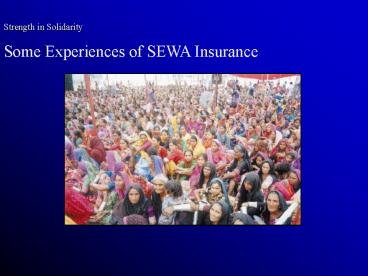Strength in Solidarity - PowerPoint PPT Presentation
1 / 22
Title: Strength in Solidarity
1
Strength in Solidarity Some Experiences of SEWA
Insurance
2
SEWA
- SEWA is a trade union of women workers in the
informal economy.
3
SEWA
- Membership 700,000
- Areas Gujarat, Madhya Pradesh, Uttar Pradesh,
Delhi, Bihar and Kerala. - Founded in 1972 by Ela R. Bhatt
Gujarat
Madhya Pradesh
Uttar Pradesh
Delhi
Bihar
Kerala
4
Informal Workers in India
The four major categories of workers are
- Home-based workers
- Vendors (of all types of wares)
- Manual labourers and service providers
- Producers
5
SEWAs Goals
Full Employment
Self Reliance
6
Women and Risks Some Experiences
- Risks are multiple and frequent
- The poorest of women and their families face the
most - severe and frequent risks.
- They result in economic leakages, asset losses
and decapitalisation. - They result in indebtedness and families
remaining in or going deeper into poverty
7
Women and Risks Some Experiences
- They may be chronic or acute.
- Chronic unemployment, poverty, certain
illnesses - Acute natural disasters, sickness
- Women need support to tackle risks through an
insurance package - Women are willing to contribute for insurance.
8
Current Insurance Membership
78,308 Women 21,844 Men 2745 Children 102,897
Total insured
9
Current insurance packages offered
Note 1. All figures are in Rupees. 48 Rupees
1 US 2. Fixed deposit means a
one-time amount deposited from which interest
accrued is used to pay the
insurance premium.
10
Life insurance claims/premium ratio
11
Health insurance claims/premium ratio
12
Life health insurance claims/premium ratio
13
Life insurance claims
- Trend towards rising number in absolute claims,
but decreasing rate per 1,000 members
14
Life insurance claims
- Current rate of claims is 5/1,000 members/year
- Less than 11 of claims are for accidental death.
- The cause of death is often difficult to
determine, cardiovascular disease is the most
commonly cited. - Approximately 17 of claims are rejected.
- Almost all accepted claims result in payment of
Rs 3,000 (63 USD) for death by natural causes. - Average time from death to reimbursement is
almost 45 days.
15
Health insurance claims
- Trend towards rising number in absolute claims,
but no obvious trend in rate per 1,000 members
16
Health insurance claims
- Current rate of claims 15/1,000 members/year
- 11 of claims did not involve admission to
hospital most of these were fractures. - Preventable illnesses comprise most common causes
of hospitalisation, e.g. injuries,
gastroenteritis, malaria - 14 of claims rejected
- Average total cost of hospitalisation was Rs.
4500 (US 94) and the average rate of
reimbursement was 47
17
SEWA Insurance functions as a cooperative
workers themselves manage services and promote
coverage
- They also
- decide on claims
- ensure rapid claim
- disbursement
- decide on premium,
- new products, policies
- begin to negotiate with insurance companies
18
Lessons Learned
- 1. Insurance is an essential economic support to
women during crises. In ten years, 17,294 women
have received Rs 2.8 crores or US 583,000 by
way of claims. - 2. Peoples own insurance programs can be viable.
19
Lessons Learned
3. Health insurance creates demand for government
health services.
4. For affordability, panel of providers can be
developed 5. Linkage with health programs
focussed on prevention and promotion enhances
viability of health insurance.
6. Linking insurance to other financial
services (savings and credit) promotes
long-term insurance coverage.
20
Lessons Learned
9. Education on insurance accelerates membership.
7. Women begin future planning
through insurance.
10.Insurance by and for poor women,encourages
their organizing and contributes to their
economic empowerment.
8. Insurance promotion can be a source of
employment.
21
Lessons Learned on Sustainability
1. Promotional, marketing and claim servicing
costs are high when insuring the poor.
2. Expansion of insured members helps spread
costs.
3. Premiums can be increased gradually.
22
Lessons Learned on Sustainability
4. Government and private equity is
required for overall sustainability.
5. Workers government and private
contributions should be a third each.
6. Investing in the poor, especially women,
through social insurance is viable.































